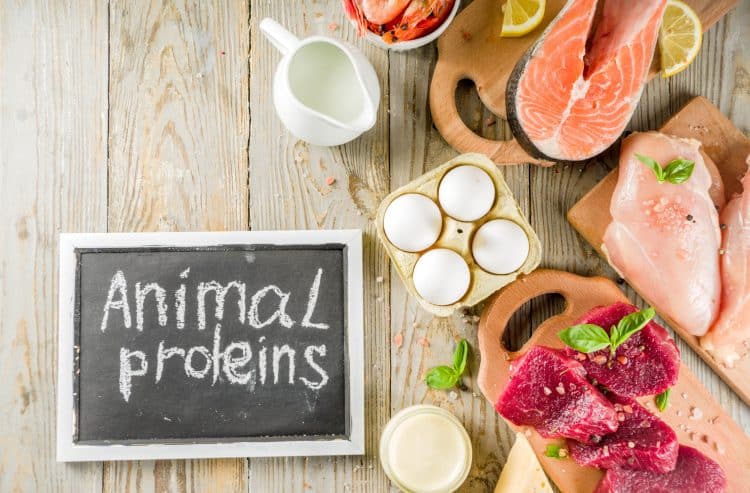Anything above 2 grams of protein per kilogram of body weight is generally considered too much protein. A seasoned athlete or bodybuilder may be able to nudge this number as high as 3.5 grams (1). However, even 150 grams can be too much protein for some people.
A high-protein diet can help you achieve your fitness goals, including building muscle and losing weight. However, eating too much protein can backfire, leading to weight gain, bad breath, and even kidney stones.
As a seasoned nutritionist with over 20 years of experience, I customize the protein intake for each client based on their personal metrics and fitness goals. In this article, I’ll take you over how to determine how much protein you need and at which point it becomes excess.
Factors Affecting Protein Intake

Protein is made up of smaller units known as amino acids. These play numerous roles in the body, from building muscles to regulating metabolic processes. Protein is required for the formation and development of various tissues, organs, hormones, and even antibodies.
Your optimal daily protein intake will vary depending on factors such as:
Age
The recommended dietary allowance (RDA) of protein for adults is 0.8 grams per kilogram of body weight per day (2). This is adequate to meet basic physiological needs and avoid any protein deficiency.
Growing kids and teenagers need plenty of protein for optimum growth and development. Older adults may also need more protein, ranging from 1.0 to 1.2 grams per kilogram of body weight, to prevent age-related muscle loss (3).
Gender
I am all for gender equality, where applicable. However, nature has created males and females differently in terms of their muscle mass, hormonal profiles, and metabolic rates. This, in turn, influences their protein requirements.
On average, women need about 46 grams of protein daily, while men require about 56 grams.
Pregnant or breastfeeding women will need more protein to support the growth of their babies as well.
Activity Levels
Just how physically active you are can change your protein RDA. Does your job involve sitting at a desk for most of the day? Are your evenings spent lounging on the couch watching Netflix, news, or sports? Sedentary individuals will need less protein than moderately active people.
If you engage in rigorous training or endurance activities, a higher protein intake will help fuel your performance and boost muscle recovery. Bodybuilders and athletes require about 1.2 to 2.2 grams of protein per kilogram of body weight per day, depending on the intensity and duration of their workouts. (4)
Body Composition: Weight and Height
To further customize your protein intake, you should take into consideration your height, weight, and body composition. Are you overweight or underweight? What is your lean body mass and metabolic rate?
Your recommended daily protein intake should also be tailored to meet your fitness aspirations. What are your fitness objectives — weight loss, muscle gain, or weight maintenance?
Understanding such factors, needs, and goals will help you tailor your protein intake and achieve the desired outcome effectively.
How To Use a Protein Intake Calculator
The easiest way to determine the amount of protein you need daily is through our online protein intake calculator. It is user-friendly, reliable, and accurate.
You can set it to your preferred measurement system — imperial (pounds) or metric (kilograms). Select gender, then enter your age, weight, height, and activity level. There is also a custom option for personalized precision in your activity levels. Now, simply click the ‘calculate’ button to generate results tailored to your needs.
Based on your input, your basal metabolic rate (BMR) and recommended daily calorie needs are calculated first. You will get both CDC and ADA recommendations for your daily protein intake. More importantly, you will also get a nutritionist recommendation that takes the guesswork out of how many grams of protein you should eat daily. The minimum and maximum protein intake is also clearly mentioned.
How Much Protein is Too Much?
For most adults, the upper safe limit for protein intake is about 2 grams per kilogram of body weight. So, if you weigh about 80 kilograms (176.3 pounds), this translates to a maximum of 160 grams of protein per day.
That’s quite a lot of protein!
Let me give you an idea of just how much food this can add up to.
A serving of chicken breast (100 grams or 3.5oz) contains approximately 31 grams of protein. To get 160 grams of protein, you must eat five servings of chicken breasts daily.
According to research, the daily intake limit can be increased to 3.5 grams per kilogram of body weight for well-adapted individuals (1).
This means an 80-kilogram person can increase his daily protein intake to a maximum of 280 grams. Now, that’s around nine servings of chicken breasts a day! Before you start heaping your plate with protein-rich foods, note that the keyword here is “well-adapted individuals.”
Every individual is different. It is advisable to keep your protein intake under 2 grams per kilogram of body weight and see how your body responds.
Finding the Right Balance of Protein
Eric Berg (Doctor of Chiropractic degree ) shared his concerns over a high protein intake:
“You really only need to eat 0.4 grams of protein your body weight. On average, that translates to about 25-35 grams of protein each meal. Generally speaking, any more protein than that will turn into sugar. Too much protein affects sleep quality because of the phosphorus in protein. Too much protein can raise insulin and cause you to gain weight.”
His words are directed more toward sedentary to moderately active people following restrictive diets for weight loss. If you are on a keto diet, following intermittent fasting schedules, or eating just one meal a day, then going over even 0.4 grams may be considered too much for you.
If your fitness goals and workout regimen require it, you can slowly increase your protein intake. Allow your body to adapt before gradually increasing the protein load. Once you are “well-adapted,” you may be able to nudge your dose closer to the upper limit of 3.5 grams per kilogram of body weight.
What Happens if You Eat Too Much Protein?
Your body has a limit on the quantity of protein it can effectively manage. Once you cross that threshold, you may experience health issues such as digestive discomfort, kidney strain, and even problems with your blood vessels.
The adverse effects of too much protein intake usually occur with regular and prolonged overconsumption. Overindulging occasionally shouldn’t be a problem.
You may end up with undesirable side effects if you consistently overshoot your recommended intake. Remember, moderation is vital to safeguarding your health in the long run.
Here are seven signs you could be eating too much protein:
Digestive issues
Bloating, gas, or constipation can be a sign of excessive protein intake. This is especially true if you suddenly increase your protein intake.
A lack of fiber can be another reason for digestive troubles on a high-protein diet. While you can get high-quality protein from animal sources, they lack fiber. So make sure to include plenty of fiber-rich plant protein sources such as quinoa, beans, lentils, and chia seeds in your diet.
To improve your digestive health, add probiotic-rich foods high in protein, such as yogurt, kefir, tempeh, and miso.
Nutrient imbalances
Focusing too much on protein may lead to nutritional deficiencies. Follow a balanced diet to ensure you get all the essential nutrients you need. Include fruits, vegetables, nuts, and seeds to get a wide array of vitamins, minerals, and fiber.
Fatigue and weakness
You may experience fatigue and weakness if your diet lacks carbs or fats. Unless you are keto-adapted, cutting too many carbs can negatively impact your brain function, alertness, and focus.
Increased urination
Protein metabolism generates waste products like urea and ammonia. These are flushed out of the body through urine. Thus, a high protein intake can increase urine production, and you’ll find yourself running to the bathroom more frequently. As a result, you may find yourself feeling thirstier than usual. A dry mouth can also be an indication of the same.
You may end up getting dehydrated if you do not replace all the water you lose this way. So, drink plenty of water and electrolyte-rich beverages throughout the day.
Kidney strain
If you have any existing kidney problems, always consult your healthcare provider before increasing your protein intake. Your need to pee frequently can put unwanted strain on your kidneys. Elevated uric acid levels from protein metabolism can increase the risk of kidney stones.
Weight gain
Weight gain can be an undesirable side effect of going overboard with protein consumption.
Most people increase their protein intake to lose weight and build muscle. However, overeating protein can lead to a bulging belly.
Excess calorie intake, regardless of source or macro content, will result in weight gain. If you eat more calories than you burn, you will put on weight.
Bad breath
Bad breath can be an unpleasant side effect of eating too much protein.
Ammonia is a byproduct of protein metabolism. It has a distinctively pungent smell. If more ammonia is produced due to a high protein intake, this can become evident in one’s breath.
If you are on a keto diet, with low-carb and high-protein intake, the resulting ketones can also add to the bad breath. Keto breath is generally described as similar to the smell of nail polish due to the presence of acetone.
Dehydration will worsen the bad breath due to reduced saliva production and increased bacterial action. To avoid the bad breath associated with high-protein diets, stay well hydrated. Brush and floss regularly to maintain good oral hygiene.
FAQs
Are high-protein diets safe?
A high-protein diet is usually safe if you stay within the recommended daily protein intake range. For most people, the maximum daily recommended amount of protein is about 2 grams per kilogram of body weight.
Well-adapted people, such as bodybuilders and seasoned athletes, may be able to increase their daily protein intake to 3.5 grams of protein per kilogram of body weight.
Your personalized protein recommendations are based on factors such as your age, sex, weight, height, and physical activity. Taking more protein than the recommended amount can lead to undesirable side effects and health issues.
Who should avoid eating too much protein?
People with pre-existing kidney conditions or impaired kidney functions should be careful with their protein intake, as taking too much protein can lead to further complications.
Those with severe liver disease, such as cirrhosis, should also practice caution with their protein intake. If you have digestive disorders, especially inflammatory bowel disease (IBD), you may have difficulty digesting large amounts of protein.
Is 200 grams of protein a day too much?
This depends more on your body weight, activity levels, and fitness goals. The recommended protein intake for bodybuilders and athletes ranges from 1.6 to 2.2 grams per kilogram of body weight.
A bodybuilder weighing about 90 kilograms will need 150 to 200 grams of protein to support his muscle growth, repair, and recovery. His max daily protein intake is capped at 3.5 grams per kilogram of body weight if he is well-adapted to high protein intake.
If you are in the latter category, even if you weigh just 60 kilograms, you can still have about 200 grams of protein daily.
Experiment and see how your body responds. It’s best to gradually increase your protein intake and allow your body time to get used to the high protein intake.
Does eating more protein than recommended translate to more muscle gains?
No, it doesn’t. If you eat more protein than needed, the excess calories will get stored as body fat, not muscle. Animal protein sources tend to be high in saturated fat. Eating too much of these can raise your blood cholesterol levels and increase your risk of heart disease. Too much protein can also strain your kidneys and increase the risk of kidney stones.
When is the best time to consume protein: before or after a workout?
Your protein consumption should be spread throughout your day. You can have 15 to 30 grams of protein with each meal. You should also time your high-protein meals around your workouts. Such meals can have 20 to 40 grams of protein based on the intensity of your workout.
You may have heard of the post-workout “anabolic window” for maximizing muscle gains. This is the period within which you must supply your body with all the amino acids it needs for muscle protein synthesis. About 45 minutes to an hour after a workout is considered the golden hour.
Recent research suggests that this window is open for five to six hours after your workout (5). This also depends on when you had your pre-workout meal. If you had a protein-rich meal an hour before your workout, you must have your post-workout within three or four hours. If your meal was two to three hours before your workout, then it’s better to have some protein within an hour or so after your workout.
To sum up, the time between your high protein pre-workout and post-workout meals should not be more than five to six hours apart.
Wrapping Up
While protein is crucial for health and fitness, too much protein can have adverse effects. There is no single answer to “How much protein is too much?”
Most adults can safely consume about 2 grams of protein per kilogram of body weight daily, while seasoned athletes or bodybuilders may be able to increase their daily protein intake to 3.5 grams per kilogram of body weight.
Your optimal protein intake is based on factors such as age, gender, and activity levels. A protein intake calculator can give you a personalized recommendation that tells you exactly how much protein you should eat to achieve your fitness goals. Anything beyond that is too much protein.
References
Fitness Volt is committed to providing our readers with science-based information. We use only credible and peer-reviewed sources to support the information we share in our articles.
- Wu, Guoyao. (2016). “Dietary protein intake and human health.” Food Funct, 7(3), 1251-1265.
- Marta Lonnie, Emma Hooker, Jeffrey M. Brunstrom. (2018). “Protein for Life: Review of Optimal Protein Intake, Sustainable Dietary Sources and the Effect on Appetite in Ageing Adults.” Nutrients, 10(3): 360.
- Bauer, Jürgen et al. (2013). “Evidence-based recommendations for optimal dietary protein intake in older people: a position paper from the PROT-AGE Study Group.” Journal of the American Medical Directors Association, 14(8), 542-559.
- Iraki, Juma et al. (2019). “Nutrition Recommendations for Bodybuilders in the Off-Season: A Narrative Review.” Sports, 7(7), 154.
- Ivy, John L., PhD, and Ferguson-Stegall, Lisa M., PhD. (2013). “Nutrient Timing: The Means to Improved Exercise Performance, Recovery, and Training Adaptation.” American Journal of Lifestyle Medicine: Volume 8, Issue 4.
Tip: If you're signed in to Google, tap Follow.












